八下Unit 2 I'll help to clean up the city parks.单元复习课件(26张PPT)
文档属性
| 名称 | 八下Unit 2 I'll help to clean up the city parks.单元复习课件(26张PPT) | 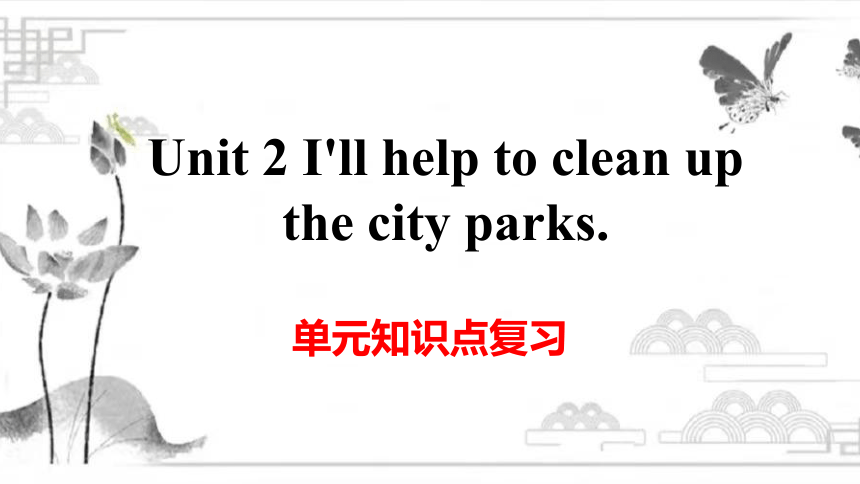 | |
| 格式 | zip | ||
| 文件大小 | 2.2MB | ||
| 资源类型 | 教案 | ||
| 版本资源 | 人教新目标(Go for it)版 | ||
| 科目 | 英语 | ||
| 更新时间 | 2023-04-09 20:50:31 | ||
图片预览

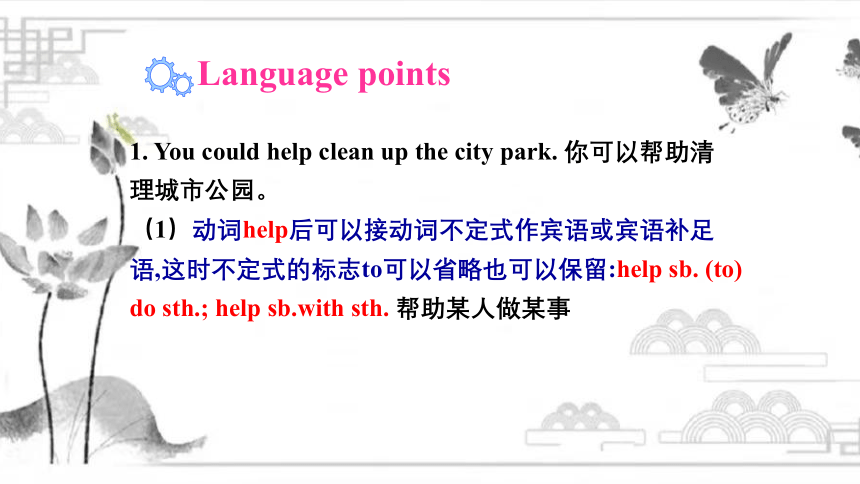
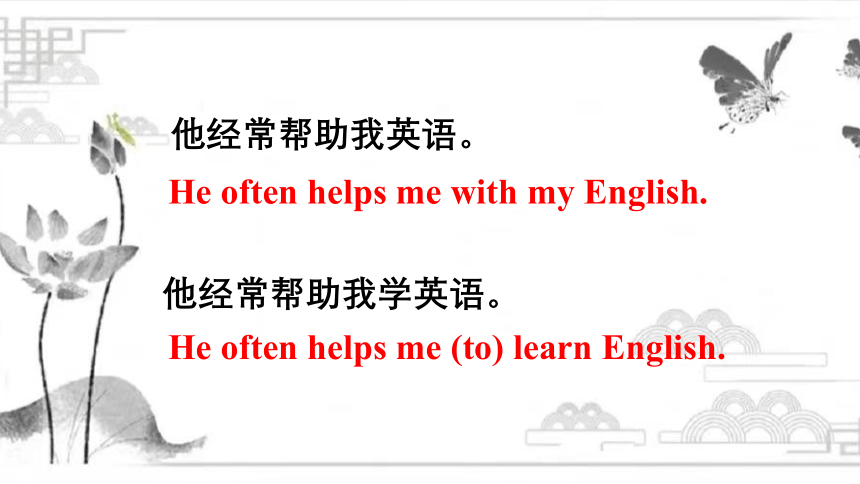
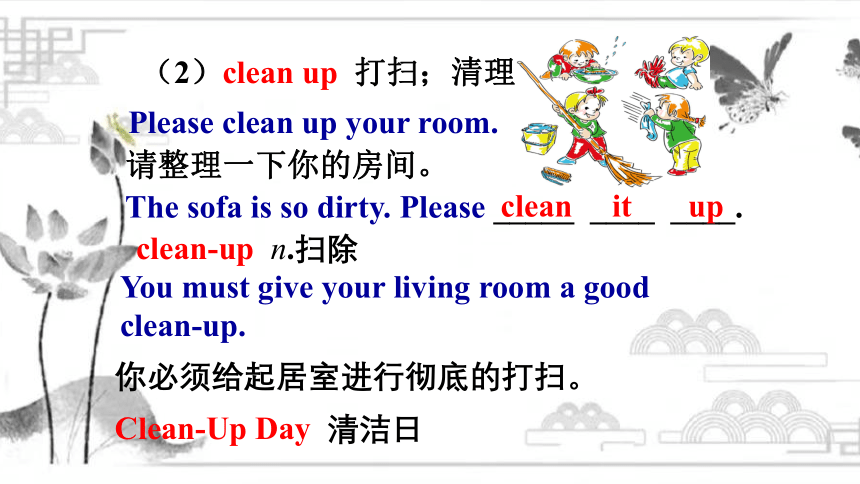
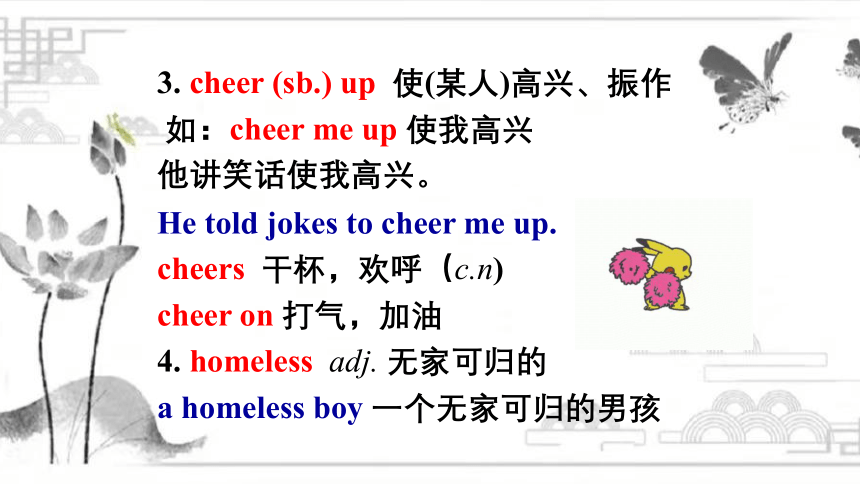
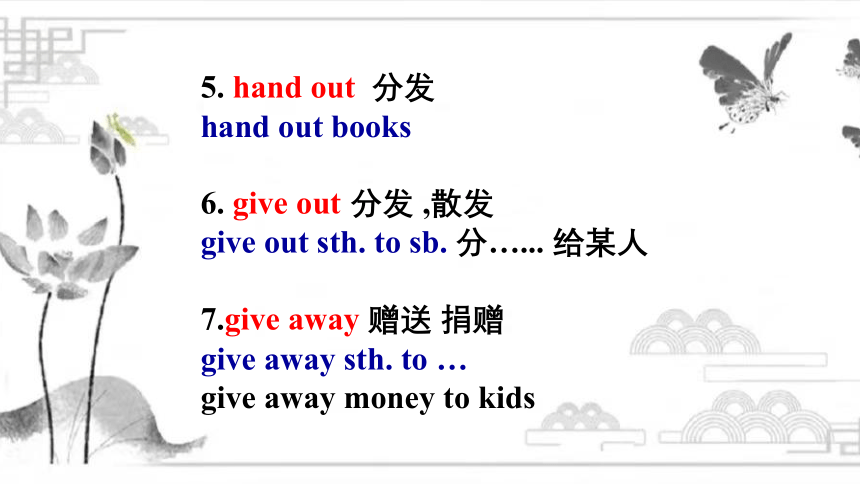
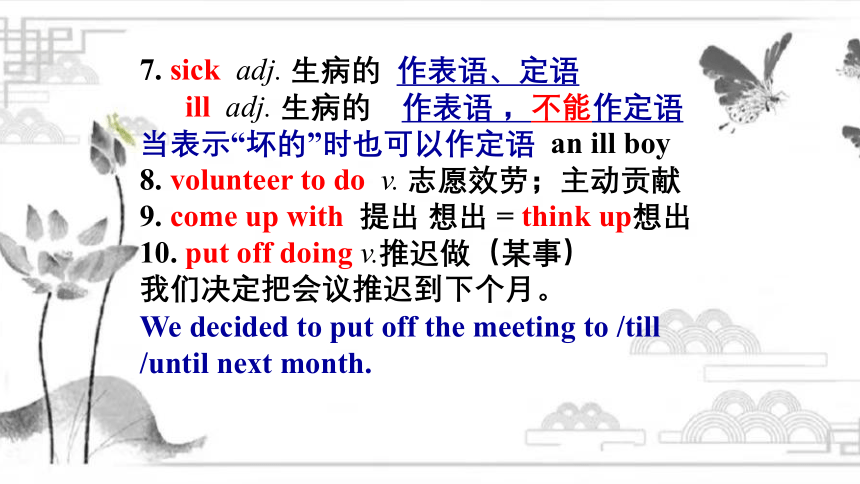
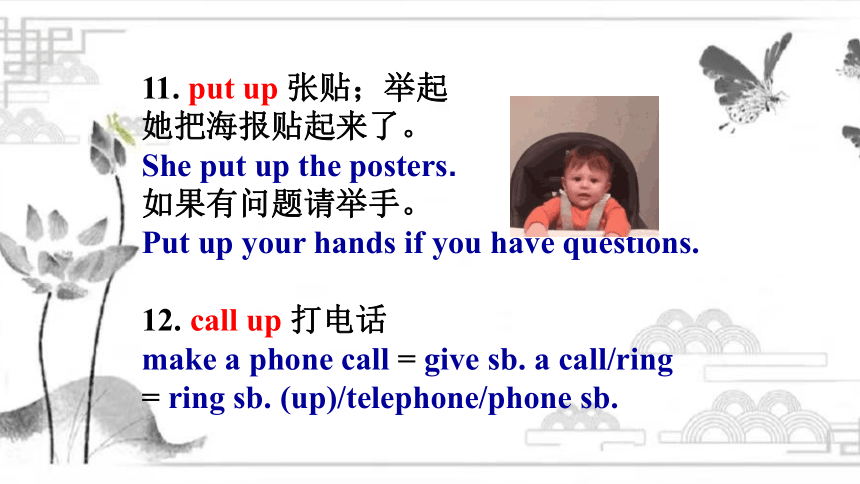
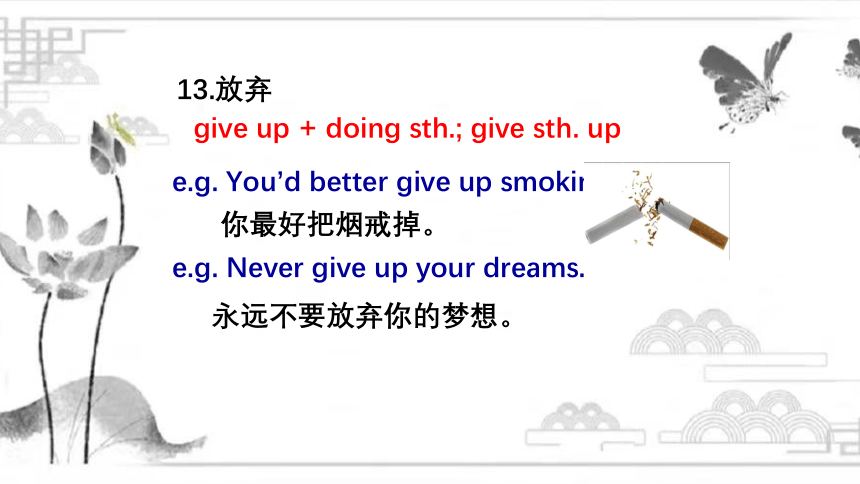
文档简介
(共26张PPT)
单元知识点复习
Unit 2 I'll help to clean up
the city parks.
1. You could help clean up the city park. 你可以帮助清理城市公园。
(1)动词help后可以接动词不定式作宾语或宾语补足语,这时不定式的标志to可以省略也可以保留:help sb. (to) do sth.; help sb.with sth. 帮助某人做某事
Language points
他经常帮助我学英语。
他经常帮助我英语。
He often helps me with my English.
He often helps me (to) learn English.
(2)clean up 打扫;清理
请整理一下你的房间。
Please clean up your room.
The sofa is so dirty. Please _____ ____ ____.
clean
clean-up n.扫除
你必须给起居室进行彻底的打扫。
You must give your living room a good clean-up.
Clean-Up Day 清洁日
it
up
3. cheer (sb.) up 使(某人)高兴、振作
如:cheer me up 使我高兴
他讲笑话使我高兴。
He told jokes to cheer me up.
cheers 干杯,欢呼(c.n)
cheer on 打气,加油
4. homeless adj. 无家可归的
a homeless boy 一个无家可归的男孩
5. hand out 分发
hand out books
6. give out 分发 ,散发
give out sth. to sb. 分…... 给某人
7.give away 赠送 捐赠
give away sth. to …
give away money to kids
7. sick adj. 生病的 作表语、定语
ill adj. 生病的 作表语 ,不能作定语
当表示“坏的”时也可以作定语 an ill boy
8. volunteer to do v. 志愿效劳;主动贡献
9. come up with 提出 想出 = think up想出
10. put off doing v.推迟做(某事)
我们决定把会议推迟到下个月。
We decided to put off the meeting to /till /until next month.
11. put up 张贴;举起
她把海报贴起来了。
She put up the posters.
如果有问题请举手。
Put up your hands if you have questions.
12. call up 打电话
make a phone call = give sb. a call/ring
= ring sb. (up)/telephone/phone sb.
13.放弃
你最好把烟戒掉。
永远不要放弃你的梦想。
e.g. Never give up your dreams.
e.g. You’d better give up smoking.
give up + doing sth.; give sth. up
14. want to be + n./adj.想成为;想变得
他想成为一名工程师。
He wants to be an engineer.
这个小男孩想要变强壮。
The little boy wants to be strong.
15. volunteer vi. & vt.自愿(做);自愿提供
他们主动提出替老太太修缮房子。
They volunteered to repair the house for the old lady.
16. make it possible for sb. to do sth.
“使得某人有可能……”
(1)make+宾语+名词,“使……”
We made him monitor.
(2)make+宾语+形容词,“使……”
His words made me happy.
(3)make+宾语+动词原形,“让……做……”
He made me work for ten hours a day.
17. make a difference 起重要作用
What you did made a difference to my life.
18. Or imagine you can’t walk or use your hands easily.
imagine意为“想象;设想”, 是及物动词,其主语一般是表示人的名词或代词。imagine一般不用于进行时,可用于被动结构。
如:You can imagine how surprised I was.
你可以想象我是多么惊讶。
I can’t imagine living without friends.
我无法想象离开朋友如何生活。
I can't imagine what Noah had in mind.
我猜不出挪亚脑子里想的是什么。
19. She talked to Animal Helpers about getting me a special trained dog. 她跟“动物助手”谈过后让我得到了一只受过特殊训练的狗。
(1)train是动词,意为“训练;培训”, 用作及物动词时,接名词、代词作宾语。还可接以“(as/to be) n./adj. ”或动词不定式充当补足语的复合宾语。train sb. to do sth. 表示“训练某人去做某事”。 另外,train也可以与介词for连用,表示“为……而进行训练”。
如:In the interest of our clients, we would train their technical staff at request.
从客户利益出发,我们会应客户要求培训他们的技术人员。
He trained his binoculars on the distant figures.
他把双筒望远镜对准远处的景物。
(2)training是名词,意为“训练;培训”, training表示“训练,受训”,用作不可数名词。training有时可用作定语。
如:They finished the preparatory training.
他们完成了预备训练。
The army training exercises ended with a mock battle.
军事训练演习以一场模拟战结束。
future dream job
learn about sth./sb.
未来理想的职业
get a strong feeling of satisfaction
产生一种强烈的满足感
the look of joy
愉悦的神情
好起来
get better
了解(关于)某事/某人
try out
参加……的选拨;试用
go on a different journey
经历一种别样的旅行
a dream come true
梦想成为现实
1.David Burt’s dream in China is to go into the west
and ______ an early childhood school there.
A. clean up B. look up C. give up D. set up
2. If _____,how can a child enjoy the happiness of life
A.being born blind and deaf
B.born to be blind and deaf
C.being blind and deaf D.born blind and deaf
3.—Dear, what about going to the beaches for vacation
—Great! _____we’re lying on the beach in the sun,
enjoying music. It must be great fun!
A. Pretend B.Promise C. Mention D. Imagine
D
D
D
构成:to + do(动词原形)
用法:
1. 用作宾语 (v. + to do )
I want to buy a computer.
She hopes to find a better job.
I wish to go with you.
动词不定式
grammar
2. 用作宾语补足语:(v. + sb. + to do )
She asked me to help her.
The teacher told him to come on time.
Edison’s mother taught him to read and write.
want sb. to do wish sb. to do
get sb. to do order sb. to do
find sb. to be like sb. to do
would like sb. to do help sb. to do
作宾语补足语不带to 的情况:
比较:
I heard her singing in the next room.
I heard her sing in the next room.
常见动词有:
使役动词: let, make, have
感官动词: see, watch, hear, feel
Let me do it.
I saw him cross the street.
3. 用作状语(adverbial):
He came to show me his new CD player. (目的)
I went there to see my teacher. (目的)
She came back to get her English book. (目的)
The boy was too scared to move.(结果)
4.用作主语
1) To be here at Christmas time is my dream.
2) To travel around the world is his dream.
3) To say is easy, to do is difficult.
(可将其用形式主语it来替换)
→It is my dream to be here at Christmas time.
→ It is his dream to travel around the world.
→ It is easy to say, it is difficult to do.
5. 用作表语
His work is to feed the animals.
Her job is to look after the patients.
My wish is to be a scientist.
Give me something to drink.
I have two books to read.
I have much homework to do.
He asked for a room to live in.
I don’t have a pen to write with.
6. 用作定语
(不定式与被修饰词有动宾关系。若是不及物动词, 介词不能省略。)
7. 疑问词who, what, which, where, when, how 加to do可构成不定式短语, 在句中可用作主语、宾语、宾语补足语、表语等。
When to start has not been decided. (主语)
I don’t know what to do. (宾语)
He can tell you where to get the book.
(宾语补足语)
The question is who(m) to ask. (表语)
Fill in the blanks according to the text.
1. 我想去帮助无家可归的人。
I’d ____ __ _____ homeless people.
2. 你可以请求医院允许你探访儿童并让他们变得更高兴。
You could ___ hospitals ___ ___ you visit the kids and cheer them up.
3. 她自愿一周去那里一次帮助孩子们学习读书。
She _________ there once a week ___ ____ kids learn to read.
4. 她决定参加一个志愿者课后阅读节目的活动。
She _______ ___ try out for a volunteer after-school reading program.
like to help
ask to let
to help
volunteers
decided to
单元知识点复习
Unit 2 I'll help to clean up
the city parks.
1. You could help clean up the city park. 你可以帮助清理城市公园。
(1)动词help后可以接动词不定式作宾语或宾语补足语,这时不定式的标志to可以省略也可以保留:help sb. (to) do sth.; help sb.with sth. 帮助某人做某事
Language points
他经常帮助我学英语。
他经常帮助我英语。
He often helps me with my English.
He often helps me (to) learn English.
(2)clean up 打扫;清理
请整理一下你的房间。
Please clean up your room.
The sofa is so dirty. Please _____ ____ ____.
clean
clean-up n.扫除
你必须给起居室进行彻底的打扫。
You must give your living room a good clean-up.
Clean-Up Day 清洁日
it
up
3. cheer (sb.) up 使(某人)高兴、振作
如:cheer me up 使我高兴
他讲笑话使我高兴。
He told jokes to cheer me up.
cheers 干杯,欢呼(c.n)
cheer on 打气,加油
4. homeless adj. 无家可归的
a homeless boy 一个无家可归的男孩
5. hand out 分发
hand out books
6. give out 分发 ,散发
give out sth. to sb. 分…... 给某人
7.give away 赠送 捐赠
give away sth. to …
give away money to kids
7. sick adj. 生病的 作表语、定语
ill adj. 生病的 作表语 ,不能作定语
当表示“坏的”时也可以作定语 an ill boy
8. volunteer to do v. 志愿效劳;主动贡献
9. come up with 提出 想出 = think up想出
10. put off doing v.推迟做(某事)
我们决定把会议推迟到下个月。
We decided to put off the meeting to /till /until next month.
11. put up 张贴;举起
她把海报贴起来了。
She put up the posters.
如果有问题请举手。
Put up your hands if you have questions.
12. call up 打电话
make a phone call = give sb. a call/ring
= ring sb. (up)/telephone/phone sb.
13.放弃
你最好把烟戒掉。
永远不要放弃你的梦想。
e.g. Never give up your dreams.
e.g. You’d better give up smoking.
give up + doing sth.; give sth. up
14. want to be + n./adj.想成为;想变得
他想成为一名工程师。
He wants to be an engineer.
这个小男孩想要变强壮。
The little boy wants to be strong.
15. volunteer vi. & vt.自愿(做);自愿提供
他们主动提出替老太太修缮房子。
They volunteered to repair the house for the old lady.
16. make it possible for sb. to do sth.
“使得某人有可能……”
(1)make+宾语+名词,“使……”
We made him monitor.
(2)make+宾语+形容词,“使……”
His words made me happy.
(3)make+宾语+动词原形,“让……做……”
He made me work for ten hours a day.
17. make a difference 起重要作用
What you did made a difference to my life.
18. Or imagine you can’t walk or use your hands easily.
imagine意为“想象;设想”, 是及物动词,其主语一般是表示人的名词或代词。imagine一般不用于进行时,可用于被动结构。
如:You can imagine how surprised I was.
你可以想象我是多么惊讶。
I can’t imagine living without friends.
我无法想象离开朋友如何生活。
I can't imagine what Noah had in mind.
我猜不出挪亚脑子里想的是什么。
19. She talked to Animal Helpers about getting me a special trained dog. 她跟“动物助手”谈过后让我得到了一只受过特殊训练的狗。
(1)train是动词,意为“训练;培训”, 用作及物动词时,接名词、代词作宾语。还可接以“(as/to be) n./adj. ”或动词不定式充当补足语的复合宾语。train sb. to do sth. 表示“训练某人去做某事”。 另外,train也可以与介词for连用,表示“为……而进行训练”。
如:In the interest of our clients, we would train their technical staff at request.
从客户利益出发,我们会应客户要求培训他们的技术人员。
He trained his binoculars on the distant figures.
他把双筒望远镜对准远处的景物。
(2)training是名词,意为“训练;培训”, training表示“训练,受训”,用作不可数名词。training有时可用作定语。
如:They finished the preparatory training.
他们完成了预备训练。
The army training exercises ended with a mock battle.
军事训练演习以一场模拟战结束。
future dream job
learn about sth./sb.
未来理想的职业
get a strong feeling of satisfaction
产生一种强烈的满足感
the look of joy
愉悦的神情
好起来
get better
了解(关于)某事/某人
try out
参加……的选拨;试用
go on a different journey
经历一种别样的旅行
a dream come true
梦想成为现实
1.David Burt’s dream in China is to go into the west
and ______ an early childhood school there.
A. clean up B. look up C. give up D. set up
2. If _____,how can a child enjoy the happiness of life
A.being born blind and deaf
B.born to be blind and deaf
C.being blind and deaf D.born blind and deaf
3.—Dear, what about going to the beaches for vacation
—Great! _____we’re lying on the beach in the sun,
enjoying music. It must be great fun!
A. Pretend B.Promise C. Mention D. Imagine
D
D
D
构成:to + do(动词原形)
用法:
1. 用作宾语 (v. + to do )
I want to buy a computer.
She hopes to find a better job.
I wish to go with you.
动词不定式
grammar
2. 用作宾语补足语:(v. + sb. + to do )
She asked me to help her.
The teacher told him to come on time.
Edison’s mother taught him to read and write.
want sb. to do wish sb. to do
get sb. to do order sb. to do
find sb. to be like sb. to do
would like sb. to do help sb. to do
作宾语补足语不带to 的情况:
比较:
I heard her singing in the next room.
I heard her sing in the next room.
常见动词有:
使役动词: let, make, have
感官动词: see, watch, hear, feel
Let me do it.
I saw him cross the street.
3. 用作状语(adverbial):
He came to show me his new CD player. (目的)
I went there to see my teacher. (目的)
She came back to get her English book. (目的)
The boy was too scared to move.(结果)
4.用作主语
1) To be here at Christmas time is my dream.
2) To travel around the world is his dream.
3) To say is easy, to do is difficult.
(可将其用形式主语it来替换)
→It is my dream to be here at Christmas time.
→ It is his dream to travel around the world.
→ It is easy to say, it is difficult to do.
5. 用作表语
His work is to feed the animals.
Her job is to look after the patients.
My wish is to be a scientist.
Give me something to drink.
I have two books to read.
I have much homework to do.
He asked for a room to live in.
I don’t have a pen to write with.
6. 用作定语
(不定式与被修饰词有动宾关系。若是不及物动词, 介词不能省略。)
7. 疑问词who, what, which, where, when, how 加to do可构成不定式短语, 在句中可用作主语、宾语、宾语补足语、表语等。
When to start has not been decided. (主语)
I don’t know what to do. (宾语)
He can tell you where to get the book.
(宾语补足语)
The question is who(m) to ask. (表语)
Fill in the blanks according to the text.
1. 我想去帮助无家可归的人。
I’d ____ __ _____ homeless people.
2. 你可以请求医院允许你探访儿童并让他们变得更高兴。
You could ___ hospitals ___ ___ you visit the kids and cheer them up.
3. 她自愿一周去那里一次帮助孩子们学习读书。
She _________ there once a week ___ ____ kids learn to read.
4. 她决定参加一个志愿者课后阅读节目的活动。
She _______ ___ try out for a volunteer after-school reading program.
like to help
ask to let
to help
volunteers
decided to
同课章节目录
- Unit 1 What's the matter?
- Section A
- Section B
- Unit 2 I'll help to clean up the city parks.
- Section A
- Section B
- Unit 3 Could you please clean your room?
- Section A
- Section B
- Unit 4 Why don't you talk to your parents?
- Section A
- Section B
- Unit 5 What were you doing when the rainstorm came
- Section A
- Section B
- Review of Units 1-5
- Unit 6 An old man tried to move the mountains.
- Section A
- Section B
- Unit 7 What's the highest mountain in the world?
- Section A
- Section B
- Unit 8 Have you read Treasure Island yet?
- Section A
- Section B
- Unit 9 Have you ever been to a museum?
- Section A
- Section B
- Unit 10 I've had this bike for three years.
- Section A
- Section B
